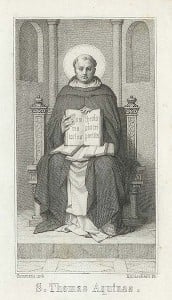 We’re blogging through St. Thomas Aquinas’ Compendium Theologiae, sometimes called his Shorter Summa. Find the previous posts here.
We’re blogging through St. Thomas Aquinas’ Compendium Theologiae, sometimes called his Shorter Summa. Find the previous posts here.
In this Chapter Thomas continues building up a model of the Trinity in Aristotelian terms. I must note that this is not the definitive model of the Trinity; as Augustine famously noted, the Trinity is a mystery that we cannot encompass. But it’s a way of thinking about the Trinity that Thomas found spiritually useful.
He continues from the previous chapter, in which he compared God’s Word to a concept in the intellect, using the human intellect as his model. But God’s knowing is only analogous to human knowing, not identical. There’s a similarity, but also a difference. First, he recapitulates and expands on what he says in the previous chapter:
But here a point of difference must be noted. What is conceived in the intellect is a likeness of the thing understood and represents its species; and so it seems to be a sort of offspring of the intellect. Therefore, when the intellect understands something other than itself, the thing understood is, so to speak, the father of the word conceived in the intellect, and the intellect itself resembles rather a mother, whose function is such that conception takes place in her.
When I understand an apple, the apple itself is in a sense the father of the idea “apple” in my mind. But here we are speaking of self-knowledge:
But when the intellect understands itself, the word conceived is related to the understanding person as offspring to father. Consequently, since we are using the term “Word” in the latter sense, that is, according as God understands Himself, the Word itself must be related to God, from whom the Word proceeds, as Son to Father.
God is not only the one understanding, but also the one understood. God Himself as the thing understood is the Father of the understand of God that is God’s word. Thus we have the first and second persons of the Trinity.
I expect some of my readers are concerned about this argument for the Fatherhood of God; but remember that we have left natural theology behind. Thomas is not attempting to prove the truths of the Faith from first principles; rather, he is trying to put the truths of the Faith into a logical order. We believe in God as Father because the Son, Jesus Christ, revealed God as “Our Father”. Thomas is simply showing one way in which we can understand God as the Father of His Word from all eternity while recognizing that there is no biological relationship involved.
____
photo credit: Public Domain; source Wikimedia Commons








